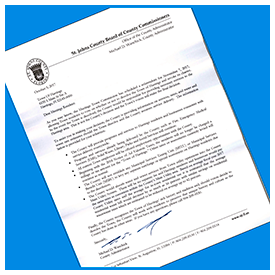Hastings voter and Historic City News reader Chris Stanton received a long-awaited letter last week that memorializes the commitments of St Johns County Administrator Michael D. Wanchick as the town readies themselves to vote whether or not to disband and become another un-incorporated part of the county.
In a letter from Wanchick dated October 3, 2017, and mailed to residents of the Town of Hastings on Friday, October 6th, according to an e-mail from his assistant, Katie Sapp, he provides a general commitment on services, taxes, and estimates of water and sewer rates, should the Town dissolve.
“The County recognizes the Town of Hastings’ rich history and tradition and, should voters decide to dissolve the Town, the County will work with residents to preserve that unique history and culture as the County has done in other areas,” Wanchick wrote.
But over the past three months several vocal members of the community who tell our reporters that the Town no longer serves any benefit to its residents, have been unsuccessful in getting straight answers about the cost of local government under an un-incorporated scenario like has been proposed. The Wanchick letter is obviously meant to reassure voters that there will be no “surprises”; however, it speaks about services in general terms and averages, which may indicate intent, but is not the equivalent of an approved budget.
- Some Hastings residents, like Hastings mayor Tom Ward, think it is a bad idea to dissolve the Town. He has expressed his opinion that it costs a small amount of money to maintain incorporated status. He would say to those who complain about the Hastings millage rate, the cost to provide services won’t go away just because it disappears as a line-item on their tax bill — it simply will be lumped into the county’s overall cost of operation.
- There are those in other un-incorporated parts of the county, like Julington Creek and Ponte Vedra Beach, who say they have their own demands on the county budget and are not keen on the idea of having to shoulder the additional expense of providing county services to Hastings. Residents of the other two incorporated cities in the county, the City of St Augustine and the City of St Augustine Beach, feel that they are already “double taxed” because their property tax bills look like Hastings residents today — a bill for 100% of the cost of their local city government, plus their share for all other parts of the county. If Hastings dissolves, those costs will become part of the overall county portion of every taxpayer’s obligation.
Of course, none of the latter have any say in the decision. Only those registered to vote in Hastings will vote on whether or not to dissolve the Town of Hastings and revoke its charter when the Hastings Commission holds the referendum on November 7, 2017.
“In the event the Town is dissolved, the County would be responsible for providing necessary services to the Hastings area,” Wanchick states. “This is not the County’s decision and the Town’s voters will make the final decision.”
This is Wanchick’s commitment to Hastings residents:
- The County will provide programs and services to Hastings residents and businesses consistent with service delivery countywide.
- Programs and services already being delivered by the County (such as fire, emergency medical services, solid waste, library, parks and social services) will continue.
- All current Town employees will be offered employment opportunities with the County.
- Beginning with the 2018 Notice of Ad Valorem Taxes, the residents will no longer be charged a millage or tax amount for the “Town of Hastings.” Other taxes or assessments currently levied will continue as normal.
- The County will not establish any Municipal Services Taxing Unit (MSTU) or Municipal Services Benefit Unit (MSBU) to levy any separate surcharge or special assessment on Hastings residents due to the dissolution.
- The County would absorb water and sewer services from Town utility operations into the County Main Utility System. There will be no separate fee and Hastings residents and businesses would pay the same rates as customers within the County’s Main Utility area. Based on average fiscal year 2017 County Utility rates and the average for in-town residential use it is estimated that the average residential water bill would decrease by as much as 56 percent with similar savings on residential wastewater rates which are estimated to be reduced on average up to 42 percent.
Although some of the dealings are spelled out in Florida law, it is still the Board of County Commissioners who must approve anything Wanchick is suggesting in his letter.
Commissioners Morris, Dean, and Johns, seem willing to go along with the administrator on anything he wants, so it is fair to assume that even if there is an objection to these offers by Commissioners Smith and Waldron, the commitment seems worth at least the paper it is written on.
Some imagined budget savings won’t be savings at all. For example, in the Wanchick letter, he writes, “All current Town employees will be offered employment opportunities with the County.” Government never seems to get any smaller despite Republican control.
Discover more from HISTORIC CITY NEWS
Subscribe to get the latest posts sent to your email.




